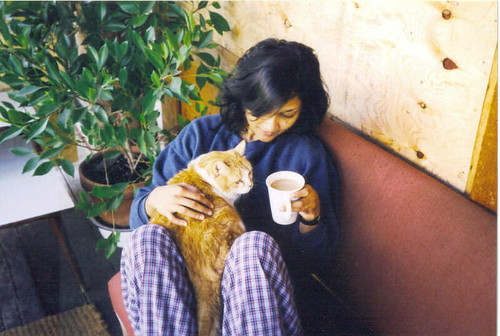Small Gods by Terry Pratchett

If a religion founded on a god is flourishing, but no one believes in the god himself/herself, does the god still exist?
Terry Pratchett, in his characteristic satirical and witty narration, tackles the tough subject of Religion and Faith in this fantastic book, Small Gods, a Discworld novel.
Rather than resorting to plain caricature or mean-spirited mockery, the book manages to distinguish between Belief in God in an elemental/primordial sense versus the Ritualistic Institution of Organized Religion which manages to perpetuate the belief in god as a by-product through dubious practices.
The concept may not be terribly novel: Gods exist as a result of people believing in them ardently. Take away the belief and the gods diminish to nothingness.
But, the handling of this idea is quite refreshing and entertaining in this book. All the more so as it does not seek to undermine any particular popular religion practiced in today's world, but, tries to highlight the human tendency to glorify the superficial while ignoring the basic tenet at the core of any such popular belief system.
And what about the gods themselves? Are they above reproach? Not at all... Pratchett proposes that gods, once ensconced as legitimate and powerful beings, fail to notice the humans who elevated them to the exalted position they luxuriate in, thereby asking to be ignored and forgotten.
The story opens in Omnia, where the chief god Om was the all-powerful presiding deity once upon a time. Now denigrated to a pathetic existence in the lowly form of a tortoise, Om desperately tries to communicate telepathically with his true believer(s) so he can regain his lost glory.
However, the sole true believer who can hear him happens to be a simple lad Brutha, tending a melon patch as a novice monk at the Omnian church.
Om is desperate to escape the fate of the small gods who are doomed to wander in the deserted wastelands with no believers to shape them into divine existence.
Through his association with Brutha, Om learns. Yes, a god, a supposedly all-powerful god, learns fast while facing physical danger and the possibility of losing his sole believer, Brutha.
Om, the god, learns to think like a human and feel like a human, realizing how tenuous his position is with Brutha gradually losing the unshakable belief in Om's benevolence and justice. Om, reduced to the helpless form of a tortoise, learns that human worshipers are not worthless pawns on his chessboard to be toyed with and tossed around, for if he did, he'll soon have nobody to toy with.
Torn between the expectations of the zealous and authoritarian Deacon Vorbis and the revelation by his god Om that he did not originate any of the commandments that Omnian church rules by today, Brutha slowly but surely develops a deeper understanding about his religion and his faith which helps him eventually stand up for his beliefs, against Vorbis, and even stand up to his god Om.
My favorite parts in this book involve the Ephebians: right from the barroom brawl of the Ephebian philosophers over the nature of truth to the pithy statement of Didactylos about Urn's steam machine built to attack evil-doers, except it becomes fuzzy trying to decide who really are the evil-doers: "Hah! He's learning! Everything works both ways!".
Some quotes that absolutely caught my fancy:
In the rain-forests of Brutha's subconscious the butterfly of doubt emerged and flapped an experimental wing, all unaware of what chaos theory has to say about this sort of thing...
Describing the Deacon's quarters:
The room was as severe as anything in the novice's quarters although it had, perhaps, a more opulent severity; it wasn't the forced bareness of poverty, but the starkness of intent.
An exchange between Om and Brutha, where Om alludes to Lord Krishna of the Hindu mythology:
"There is no other god but you. You told (prophet) Ossary that."
"Well. You know. I exaggerated a bit. But they're not that good. There's one of 'em that sits around playing a flute most of the time and chasing milkmaids. I don't call that very divine..."
An exchange between philosophers in Ephebe:
"I'm telling you, listen, a finite intellect, right, cannot by means of comparison reach the absolute truth of things, because being by nature indivisible, truth excludes the concepts of 'more' or 'less' so that nothing but truth itself can be the exact measure of truth. You bastards," he said.
Someone from inside the building said, "Oh yeah? Sez you."
Another exchange between Om and Brutha:
"... Take it from me, whenever you see a bugger puttering around talking about truth and beauty and the best way of attacking Ethics, you can bet your sandals it's because dozens of other poor buggers are doing all the real work around the place while those fellows are living like-"
"— gods?" said Brutha.
There was a terrible silence.
Labels: book review, fiction, Terry Pratchett


1 Comments:
Just happened upon your blog - enjoyed reading it. "Small Gods" sounds interesting - will add it to my to read list :)
Bhavana
Post a Comment
<< Home